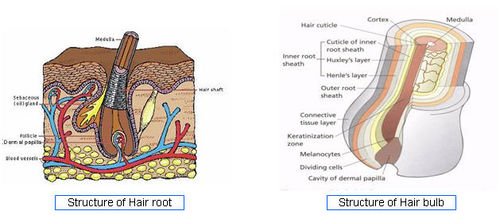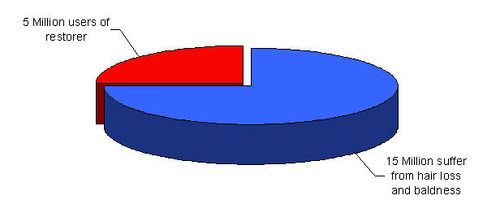Alopecia - Hair Loss
From DolceraWiki
Contents
Useful links
[1] [2] [3] [4] [5] [6] [7] [8] [9] [10] [11] [12] [13] [14] [15]
Rationale
- “Medication for men plagued by hair loss has become a topic of interest in Japan since a drug company began marketing it at the end of last year".
March 5th, 2006 – source[16]
- “An increasing number of companies are apparently turning the Chinese fear of a bald spot into big bucks with some doing so well they are branching out into other countries”
February 16, 2006 – Source[17]
Introduction
Hair Basics
- Hair is a complex and delicate part of the body
- Keeping it healthy and beautiful is a challenge
=== Reasons for Hair loss === Both men and women lose hair for similar reasons. Hair loss in men is often more dramatic, and follows a specific pattern of loss which has been termed “Male Pattern Baldness” (Androgenetic Alopecia).
Main reasons: -
- Hormonal effect of androgen
- Reduction of blood circulation around hair follicle
- Deactivation of hair matrix cells
Some facts from Japan: -
- Market size: ¥ 30 Billion
- Number of products: more than 100
(JICST-EPlus - Japanese Science & Technology)
Goals
- Summarize IP activity over the years
- Identify major players
- Conduct patent analysis
a) Composition b) Nature c) Action
Alopecia occurs, due to
- Hormonal effect of androgens
- Reduction of blood circulation around hair follicle
- Deactivation of hair matrix cells
And then
- Analyze patents pertaining to high sebum activity
Approach
Broad search on hair loss patents.
Patent information sourced through SIP.
Patents selected randomly for analysis.
Treatment composition for causes identified and categorized as follows:
- Anti-androgen
- Minoxidil
- Double action (Anti-androgen + Mindoxidil)
- Hair matrix cells activator
- Sebum production inhibitor
IP activity over years
The graph indicates:
- Number of patents filed every 5 years (except for first 7 years).
- First solution proposed in 1973.
- Filing trend indicates steep rise in activity recently.

